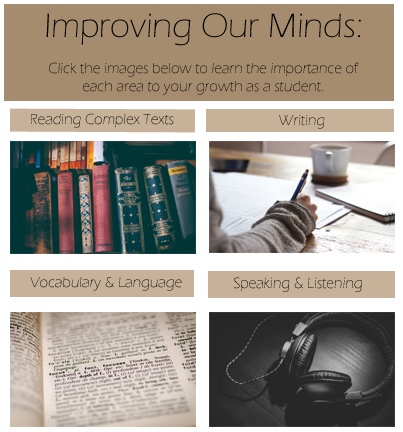
Educational Technology Program
Boise State University
Learner Description:
This page has been prepared for high school English Language Arts students as part of a post graduate program at Boise State University.
Note: All links in this page open in a new browser.
Overview:
English II students will be exposed to a wide variety of American literature and learning for its own sake, and particularly learning to communicate more succinctly captures the teacher’s intent for this course; therefore, encouragement, participation, and creativity will more clearly craft a “community of learners.”
English II will focus on the development of academic writing, critical thinking, and close textual reading through the in-depth study of literature, writing, research, language, and media as text. Inherently, students are being prepared for success in college and career. The Common Core State Standards will guide the curricular path, including extensive required and self-selected reading and writing. By the end of the year, it is expected that all students will be able to independently analyze a wide variety of texts, engage in shared inquiry, flex their independent cognitive skills, and clearly articulate their original ideas through writing, speech, and media.
Reading Complex Texts:
The American Landscape: The Geography of Identity:
Who Are We? Where Did We Come From and Where Are We Going?
- Jim the Boy by Tony Earley
- The Adventures of Huckleberry Finn by Mark Twain
- Othello by William Shakespeare
- The Great Gatsby by F. Scott Fitzgerald
- Independent Reading (IR) daily, every quarter
- Various films, short stories, poems, and speeches will be assigned (easily found on-line)
- www.StudySync.com to build/strengthen non-fiction reading and writing skills
Writing:
Students will write for a variety of purposes to strengthen their critical thinking and writing skills. Shorter writing assignments will include critical reading journals (CRJ) and blogs, while longer assignments include the three major writing modes of expository/literary analysis essays, narrative essays, and argumentative essays. Each of the longer writing assignments will embody the full writing process: proposal, drafts (initial draft, re-visioning, editing), published essay, and reflection to push students towards greater independence and growth as thinkers and writers.
Vocabulary & Language:
Vocabulary and language skills will be strengthened using two different online programs: Membean and No Red Ink.
From the website: "Membean provides guided, engaging, multimodal vocabulary instruction while our Adaptive Reinforcement Engine helps students retain what they learn." Go take a look!
No Red Ink helps teach and strengthen students' writing and grammar skills all within a fun and interactive digital format. Go take a look!
Speaking & Listening:
Students will have the opportunity to engage in Socratic Seminars for literary discussions as well as create podcasts which bridge ideas found in the literature discussed in class with personal areas of interest.